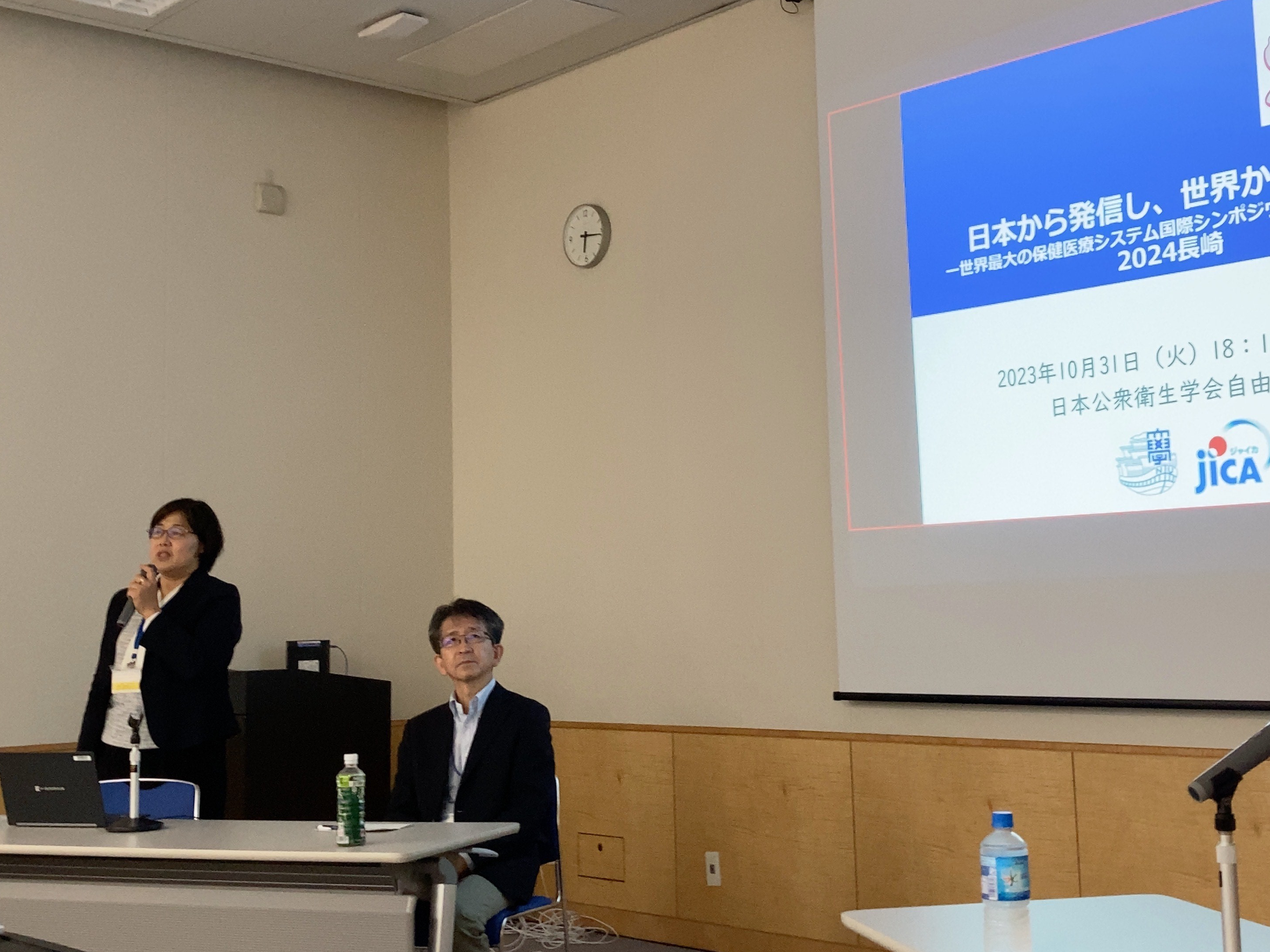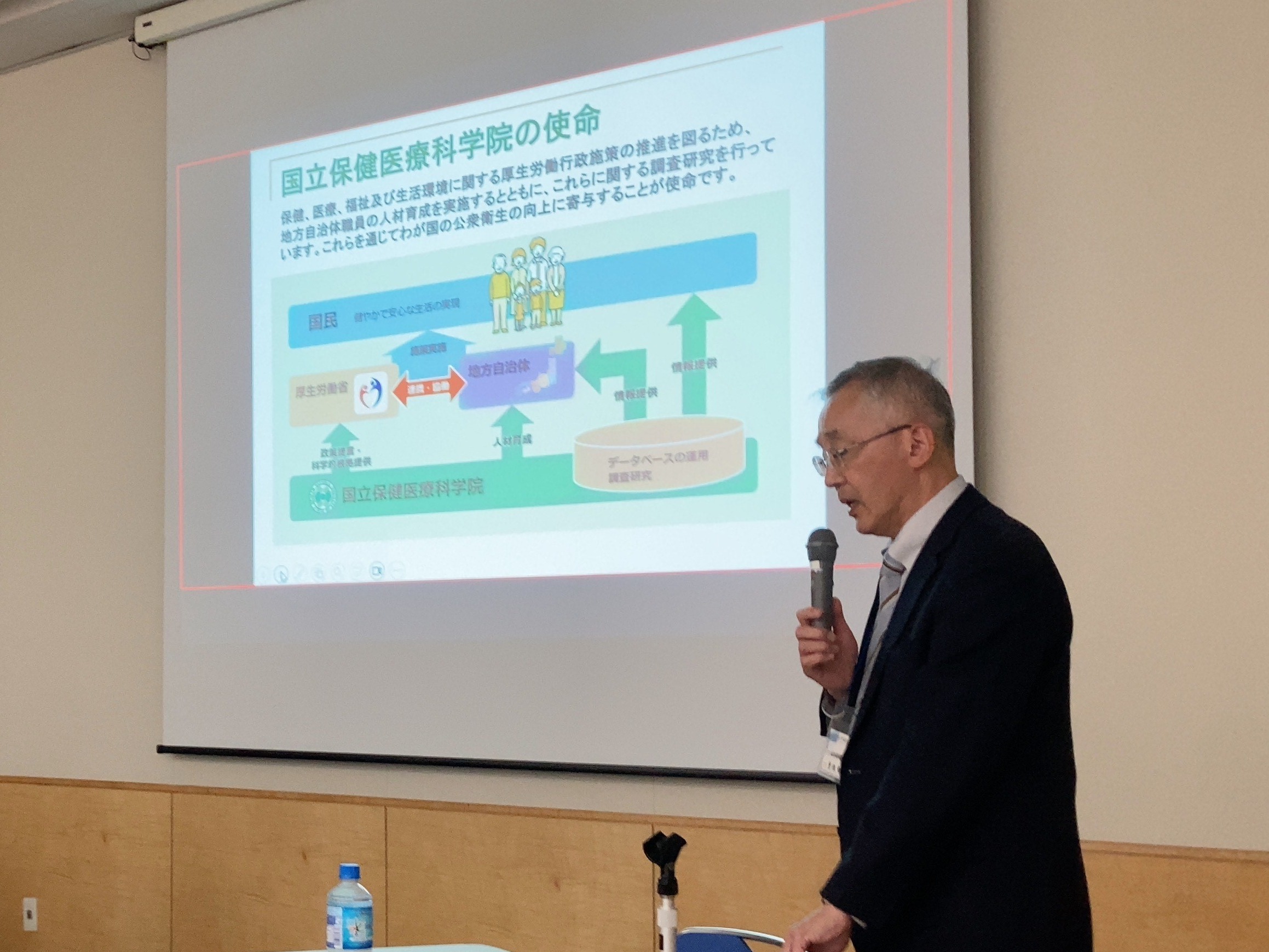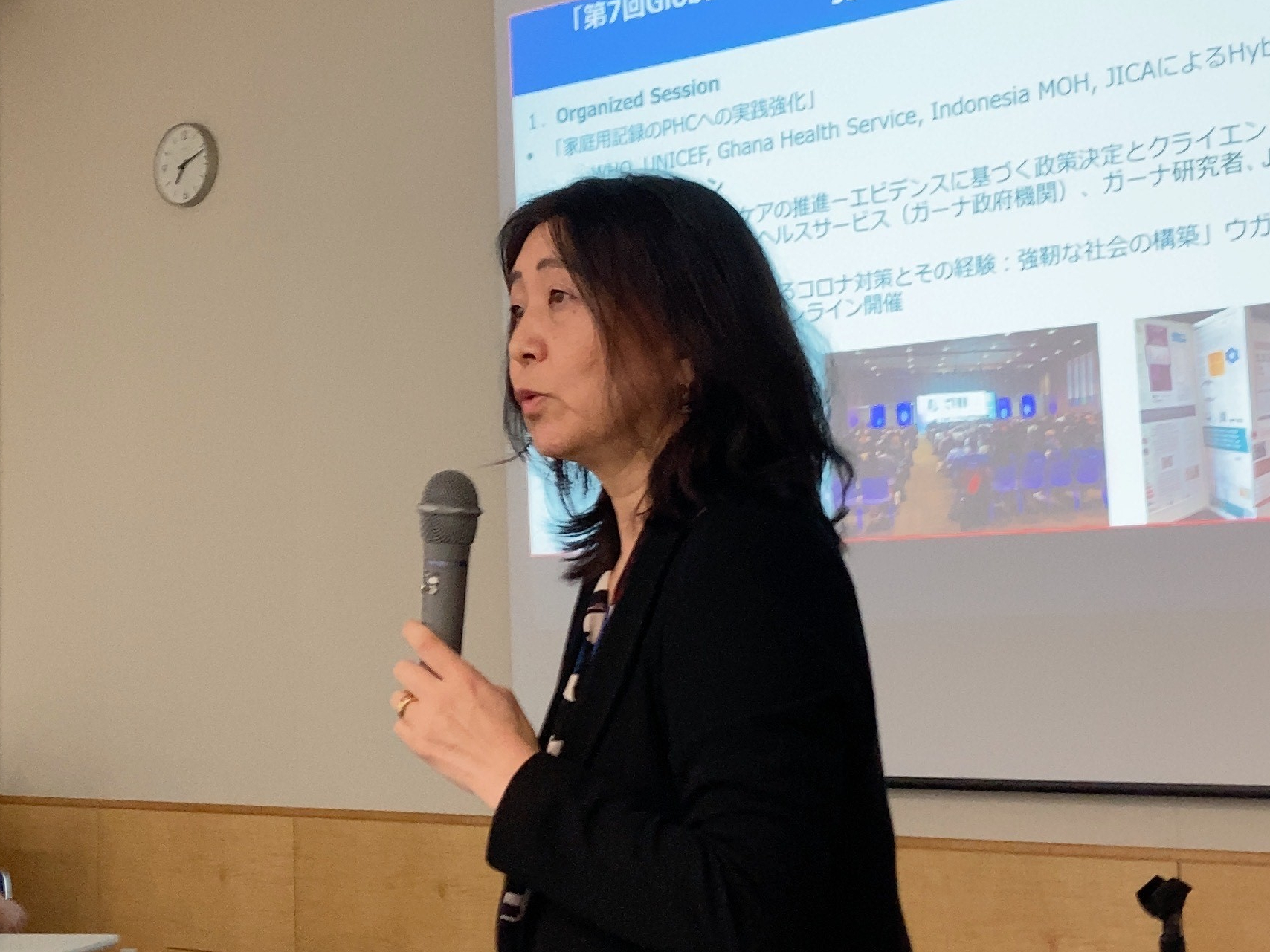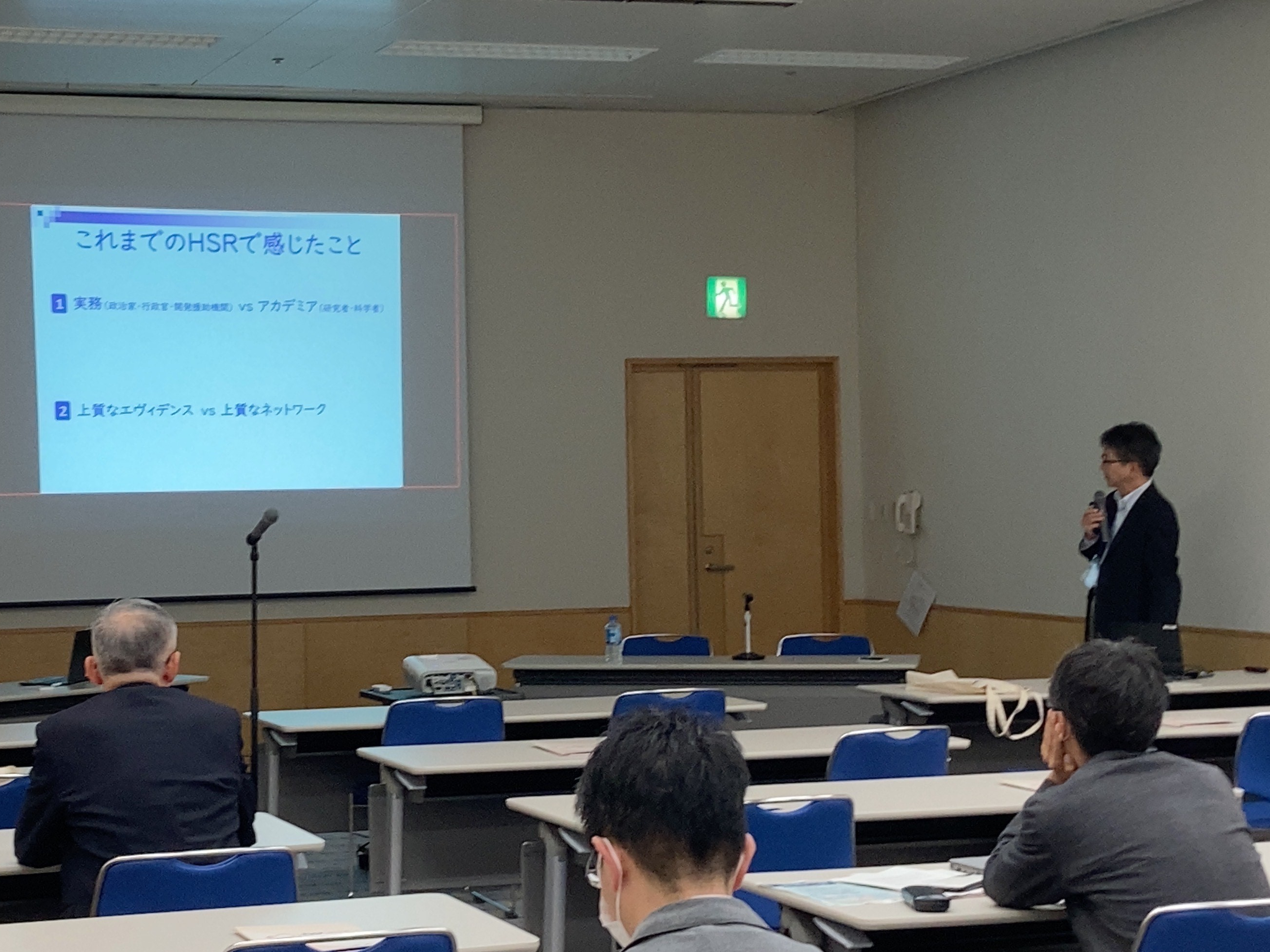An International Symposium on Health Policy and Systems Research Scheduled in 2024 was Promoted at the Annual Meeting of the Japanese Society of Public Health
2024.03.12
In Nov. 2024, JICA and Nagasaki University will jointly host the 8th Global Symposium on Health Systems Research 2024 (HSR2024) in Nagasaki. Ahead of this event, at the 82nd Annual Meeting of the Japanese Society of Public Health which started on Oct. 31, 2023, an open forum whose title is tentatively translated as “Sharing from Japan and Learning from the World: The Largest Global Symposium on Health Policy and Systems Research Is Coming to Nagasaki in 2024!” was held. Makimoto Saeda, principal research fellow, JICA Ogata Sadako Research Institute for Peace and Development (JICA Ogata Research Institute), and Hagiwara Akiko, senior advisor, JICA, participated.
Makimoto started by talking about the purpose of this session and what health policy and systems research (HPSR) is. She explained that health systems consist of six components: i) service provision; ii) information and evidence; iii) medical devices, pharmaceutical drugs and technology; iv) human resources in healthcare; v) healthcare finance; and vi) leadership and governance. HPSR is an interdisciplinary field to scientifically understand and build evidence on how these components can function and be improved to enhance the health of individuals and populations. She added that HPSR focuses on policies, systems, organizations and programs and is an action-oriented study field that aims to present helpful evidence and solutions to decisionmakers like policymakers, healthcare administrators and local residents. Makimoto then called for the members of the Japanese Society of Public Health to join HSR2024. She pointed out that this would be an excellent opportunity for sharing Japan’s health policy, systems and efforts with the world since around 1,500 researchers and healthcare practitioners from over 100 countries come together to HSR, a platform provided every two years to share and discuss knowledge on HPSR outcomes and activities.

Makimoto Saeda, principal research fellow, JICA Ogata Research Institute (left), explains what HSR is.
Next, Sone Tomofumi, president, National Institute of Public Health, gave a presentation titled “Policy-helping Research.” He shared an overview of the National Institute of Public Health and some of the institute’s activities such as human resource development focusing on local government officials and research. Sone said that the following are included in policy-helping research: bibliographic studies and small-scale studies to discover challenges that have not surfaced yet; studies to understand the actual situation of each challenge; studies to formulate policy options through overseas surveys and stakeholder interviews; and studies to build evidence that helps policymaking, such as epidemiological surveys and clinical trials. For each of these, he shared actual cases for further illustration.

Sone Tomofumi, president, National Institute of Public Health, gives a presentation on policy-helping research.
Professor Aiga Hirotsugu of Nagasaki University (the joint host organization of HSR2024 with JICA), then presented under the title “What is HSR2024? An Excellent Opportunity to Disseminate Information on Japan’s Healthcare System.” Aiga said that although Japan achieved longevity of its citizens most efficiently in the world with its healthcare system and has been drawing global attention, unfortunately, not much has been shared with the world on this healthcare system. He expressed his aspiration to use HSR2024 as an opportunity to actively disseminate this information to the world. Aiga then added that the main theme of HSR2024 is “Building just and sustainable health systems centering people and protecting the planet” and discussion will take place under sub-themes such as “Strengthening health systems for planetary health” and “Advancing justice, inclusion, and belonging in health systems, in times of peace and conflict.”
Professor Honda Ayako, Hitotsubashi University, gave a presentation titled “Studies on Healthcare Finance within HPSR.” Honda first reemphasized that HSR features interdisciplinary approaches and systems thinking for problem solving that take social institutions, cultural and political backgrounds and stakeholder relations into account. She then introduced her own work in Zimbabwe, Madagascar and South Africa as example cases. She explained that in this work, not only have rapid easy-to-use test kits for sexually transmitted diseases been developed as a new type of medical technology but joint research is being conducted with researchers from various fields in an interdisciplinary manner as well. This is ongoing to look at issues like cost effectiveness and preferences of the patients and consider how the technology can be offered as a service.
With a presentation titled “My Experience from Participating in the 7th Global Symposium on Health Systems Research (HSR2022),” Hagiwara shared her experience in the satellite session that JICA joined, “Promoting Continuum of Care in Maternal, Newborn and Child Health in Ghana: Evidence-based Policymaking and Client-centered Service Integration.” She shared the achievements of the EMBRACE (Ensure Mothers and Babies’ Regular Access to Care) Implementation Research Project, in which the Ghanaian government, the University of Tokyo and JICA aimed to improve the health of mothers and babies in Ghana between 2012 and 2016. By fostering an environment that encourages the continuum of care (CoC) for mothers and babies, as well as communicating the importance of CoC to mothers with plain language through the use of “CoC cards,” the program significantly increased the rate of mothers and babies receiving care, thereby contributing to a decrease in maternal mortality rate. This success led to the development of Maternal and Child Health Record Books and their nationwide spread in Ghana. By sharing this journey, Hagiwara explained the roles that JICA played. She said that HSR provides an invaluable opportunity to call for investments from policymakers in one’s research work by directly communicating with global stakeholders and identifying their needs. In Japan, a policy cycle that includes the process of research, evidence accumulation, policymaking and assessment of policy effectiveness is established. However, in low- or middle-income countries, research findings and healthcare policies are often inconsistent with each other. She therefore told the audience that it is meaningful to present the outcomes of research work done by Japanese industry-government-academia collaborations.

Hagiwara Akiko, senior advisor, JICA, introduces the EMBRACE Implementation Research which was conducted in Ghana.
Of the seven HSRs that have taken place to date, Aiga has attended six, in different positions at WHO, JICA and Nagasaki University. He said that while it is true that the gap between practical work (politicians, government officials and development cooperation agencies) and academic work (researchers and scientists) sinks in when you attend HSR, you can find high-quality evidence and networks because discussion topics are narrowed down through tough competition and leading figures of the global health policy and systems field are all there. Moreover, Aiga expressed his hopes on Japanese health policy and systems getting shared globally, as he thinks that “the true superstars” may be in Japan.

Professor Aiga Hirotsugu, Nagasaki University, shares his experience joining past HSR symposia.
After a Q&A session with the audience, Makimoto and Aiga shared some detail on the guidelines for applicants for HSR2024 before the session closed.

事業事前評価表(地球規模課題対応国際科学技術協力(SATREPS)).国際協力機構 地球環境部 . 防災第一チーム. 1.案件名.国 名: フィリピン共和国.

事業事前評価表(地球規模課題対応国際科学技術協力(SATREPS)).国際協力機構 地球環境部 . 防災第一チーム. 1.案件名.国 名: フィリピン共和国.

事業事前評価表(地球規模課題対応国際科学技術協力(SATREPS)).国際協力機構 地球環境部 . 防災第一チーム. 1.案件名.国 名: フィリピン共和国.

事業事前評価表(地球規模課題対応国際科学技術協力(SATREPS)).国際協力機構 地球環境部 . 防災第一チーム. 1.案件名.国 名: フィリピン共和国.

事業事前評価表(地球規模課題対応国際科学技術協力(SATREPS)).国際協力機構 地球環境部 . 防災第一チーム. 1.案件名.国 名: フィリピン共和国.
scroll